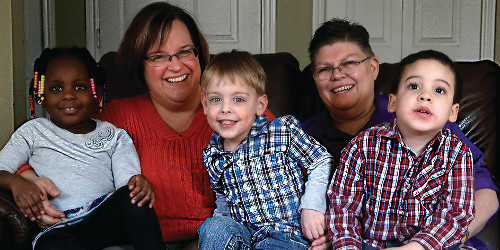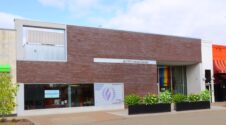BY AJ TRAGER

MICHIGAN – Three years ago, when the plaintiffs in the Michigan same-sex marriage case decided to petition the state's law on second-parent adoption, they had no idea that their story would travel as it did. April DeBoer and Jayne Rowse's case moved from the local court system, through the Federal and Appellate courts, to then be considered by the Supreme Court of the United States, all potentially to set a precedent for the entire nation. But their story is more than just achieving recognition through the courts; it started with the children that they care for.
"It's a conversation that we had all along," DeBoer said about the joint decision with her partner to start adopting children. "From the point where we started talking, we developed a really good friendship. We realized that we had a lot in common and that we wanted kids. We assumed as a gay couple we would adopt a child and we would be lucky if we got two. That was always our plan. We were blessed with four (special needs children)."
"We wanted to help children along the way," she adds.
They began fostering and adopting special needs children in 2010 from the state's overcrowded foster care system. Michigan permits same-sex partner foster care for children in need but still prohibits a same-sex couple from co-adopting due to the second-parent adoption laws. This legal discrimination under the law causes significant harm to the more than 3,000 adoptable children in the state, mich.gov reports. Unmarried state residents may not jointly petition to adopt, but the foster care system does provide them a better opportunity to house youth together since regulations do not ban same-sex partners from housing children and adolescents in need. The couple did try to apply for second-parent adoption, but were denied because they weren't married.
There are currently 13,000 children in the Michigan foster care system, most placed into the system due to parental abuse or neglect. Almost 40 percent of all agencies and 83 percent of public agencies reported making at least one adoption placement with a lesbian or gay man, lifelongadoptions.com states. As the 2010 U.S. Census showed 21,782 same-sex couples living in the state, with LGBT families making up 5.6 out of every 1,000 households, many potential families may be available to foster children but are hesitant due to restrictions on eventual adoption because of those same second-parent adoption rules.
The process to be approved as an accepted foster care family is detailed and extensive. The agency of choice will check for FBI clearances on adult members of the home, request references, seek an autobiography and a questionnaire from the family, establish emergency procedures for the home and check for physical and local clearances on top of all paperwork that must be submitted.
"There is so much you have to answer and so much information you have to give them about yourself and your background," DeBoer said.
Most children stay in the system for an average of two years, but other children can spend their entire youth in and out of homes. The foster care system is designed so that the birth parent of the child has an opportunity to return as legal guardian. Not all children make it back to their birth parents, and after the parent is deemed by the state as not fit to raise the child, the youth is placed for potential adoption – often with the foster family. Preventing same-sex couples fostering children from eventually co-adopting children in need places the youth behind their peers in terms of education and personal growth due to the lack of stability in the household. Jeanne A Howard, Ph.D, co-director for the Center for Adoption Studies at Illinois State University, points out in her affidavit filed in 2012 for the DeBoer v Snyder case that, "Most states either explicitly allow joint or second-parent adoption by same-sex couples through law or policy (18 states and the District of Columbia), have allowed it at the trial court level (12 states) or do not speak to the issue," and that, "It is clearly in the best interest of children to have both parents legally recognized. Second-parent and joint adoptions protect children by giving children the legal and psychological security of having two legal parents." The continuous harm placed on children because Michigan won't allow for same-sex marriage and second-parent adoption is a focal point in the DeBoer case.
Protections provided to the child(ren) of second-parent adoptions include many financial benefits such as: automatically establishing rights to inheritance, Social Security benefits, retirement benefits, health insurance coverage and protection from wrongful death of both parents to medical, educational and other legal decisions made for the child. In the absence of second-parent adoption, if the child loses his or her legal parent to death or other permanent circumstances, they could lose their relationship with the second-parent altogether and be thrust back into the foster care system. A heterosexual couple, however, would be granted full second-parent adoption rights if they were married; however, Michigan has outlawed same-sex marriage since the voter approved Michigan Marriage Amendment in 2004. Though Michigan's ban on same-sex marriage was overturned in March 2014 when Federal Judge Friedman ruled in favor of the DeBoer family, the 6th Circuit Court of Appeals found the states' arguments stronger in its Aug. 6 ruling and stated in the 68-page opinion: "Our judicial commissions did not come with such a sweeping grant of authority, one that would allow just three of us – just two of us in truth – to make such a vital policy call for 32 million citizens who live within the four states of the 6th Circuit."
Opponents of same-sex parent adoption argue that children are harmed by being raised by lesbians or gay men, but a recent study from University of Melbourne found that children of LGBT couples are doing well in the face of stigma. While the study did warn that stigma was an ongoing challenge for these children and could have an impact on their health and well being, research from the Australian Study of Child Health in Same-Sex Families confirmed earlier findings from the same data set which revealed that children from same-sex households were 6 percent more likely than children with heterosexual parents to have increased general health and family cohesion.
"We know that same-sex attracted parents are more likely to share child care and work responsibilities more equitably than heterosexual parent families, based more on skills rather than gender roles. This appears to be contributing to a more harmonious household and having a positive impact on child health," said Dr. Simon Crouch, the lead researcher from Jack Brockhoff Child Health and Wellbeing Program, Centre for Health Equality at the University of Melbourne.
Those same opponents acknowledge that having children languish in foster care is not a feasible option in the debate. Rep. Paul Ryan (R-Wis.), for example, opposes same-sex marriage but in 2011 reversed his view on adoption by lesbian and gay parents, suggesting that "orphans" in gay households are better off than with no family at all. An estimated two million LGBT people are interested in adopting nationwide and an estimated 65,500 children, 4 percent of total adopted youth, currently live with and have been adopted by an LGB parent.
Meanwhile, the fight for same-sex second-parent adoption isn't over for Michigan. The DeBoer-Rowse family, with the rest of the state, waits to get word if SCOTUS will hear their case in the 2015 cycle. DeBoer and Rowse continue to do what they've been fighting to do: parent.
"Its the every day little joys; watching them (their four children) learn to count and read, and watching the joy in their faces as they grow up and learn things. We took what was given to us and we love each and every one of them. It's how our family was built and how it came to be," DeBoer said. "And I know sometimes four is a little overwhelming, but they are four wonderful kids."












